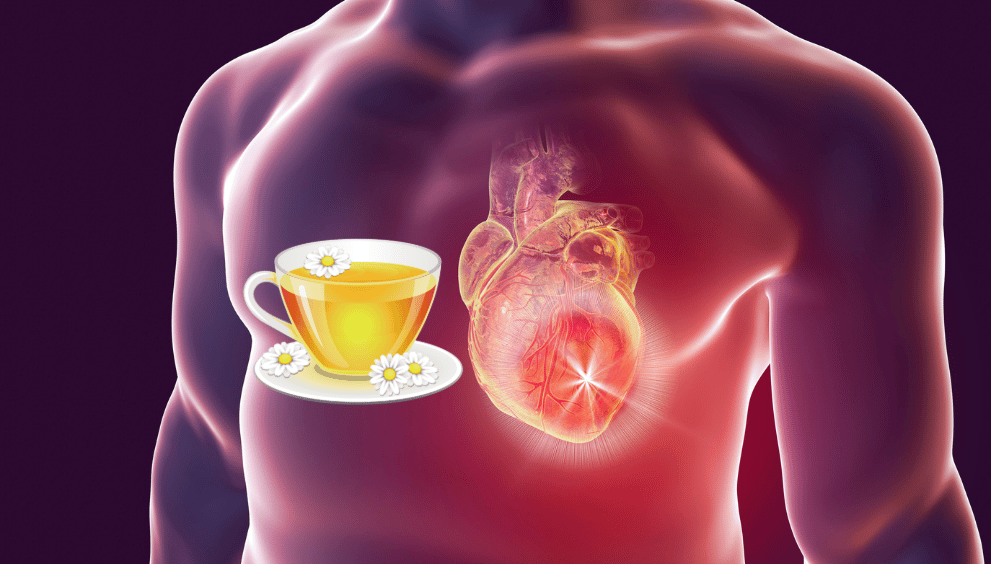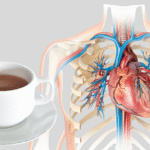Is chamomile tea good for heart palpitations? Discover its calming benefits, risks, and how this herbal tea may help reduce stress-related symptoms. Heart racing out of nowhere? Feel your heart fluttering, skipping, or racing for no apparent reason. You’re not alone—and it can be scary. Heart palpitations are often harmless. Still, many people look for natural ways to soothe their heartbeat. One popular remedy is chamomile tea. Many women feel occasional heart palpitations. This often occurs during periods of stress or hormonal fluctuations. Could something as simple as chamomile tea help?
But is chamomile tea good for heart palpitations—or could it make things worse? Chamomile, with calming compounds like apigenin, may help reduce stress palpitations. It works by relaxing your nervous system. This article explains how it works when to use it, and who should skip it. This way, you can make a wise, heart-healthy choice.
Quick Answer
Yes, chamomile tea may help with heart palpitations caused by stress or anxiety. Its calming effect on the nervous system may regulate heart rhythm. Don’t use it for heart problems. Avoid it if you have ragweed allergies or take blood thinners.
Purpose
This article explains how chamomile works. We’ll cover who it helps, who should avoid it, and safe usage. Science and expert opinions support all this.
2. What Are Heart Palpitations?
Heart palpitations feel like your heart is fluttering, pounding, or racing. Sometimes, it even skips a beat. They frequently occur without warning. Most episodes last a few seconds. Still, they can feel alarming, especially if you don’t know what’s causing them.
Common Symptoms:
- Sudden heartbeat awareness
- Fluttering or flip-flop sensation
- Pounding in the chest, throat, or neck.
- Brief pauses or skipped beats
Common Causes in Women:
- Stress and anxiety trigger adrenaline spikes.
- Hormonal changes—especially during PMS, pregnancy, or menopause.
- Caffeine or sugar overload overstimulates the nervous system.
- Electrolyte imbalance—low magnesium or potassium.
- Lack of sleep increases heart rate variability.
When are palpitations harmless?
Occasional palpitations from stress, caffeine, or dehydration are often harmless. They usually go away with rest, hydration, or relaxation.
When to See a Doctor
Seek medical help if you experience:
- Palpitations lasting more than 30 seconds.
- Chest pain, dizziness, or shortness of breath.
- History of heart disease, high blood pressure, or arrhythmias
To find the proper natural support, start by understanding your symptoms. Calming teas can help soothe your heart without the need for medication.
3. How Chamomile Affects the Heart
How chamomile affects the heart.
Chamomile tea isn’t just for bedtime. It has potent calming effects that can benefit your heart. This is especially true when stress, anxiety, or poor sleep lead to palpitations. Here’s how it works:
1. Calms the nervous system.
Chamomile has apigenin, a natural flavonoid. It links to GABA receptors in the brain. This is like how anti-anxiety drugs, such as Valium, work. However, chamomile does this without side effects. This action helps lower adrenaline spikes. These spikes often cause heart palpitations. Chamomile can calm the central nervous system. This may help steady an erratic heartbeat caused by stress.
2. Reduces inflammation.
Chronic inflammation has been linked to irregular heart rhythms and cardiovascular stress. Chamomile is full of antioxidants and anti-inflammatory compounds. These may help protect blood vessels and support heart function. While it’s not a cure, reducing inflammation may lower your risk of palpitations over time.
3. May Improve Sleep
Poor sleep can directly affect heart rate variability and trigger nighttime palpitations. Chamomile tea is widely used as a natural sleep aid thanks to its gentle sedative properties. A cup of bowl milk before bed can help you fall asleep more quickly. It also enables you to stay asleep longer and lowers the chance of waking up with a racing heart.
4. Benefits of Chamomile Tea for Palpitations
Chamomile tea isn’t just a cozy bedtime ritual—it offers targeted benefits that may help reduce heart palpitations, especially those linked to stress, anxiety, or sleep issues. Here’s how it supports a calmer, steadier heartbeat:
| Benefit | How It Helps |
| Reduces Stress & Anxiety | Calms the sympathetic nervous system, reducing adrenaline that can trigger irregular heartbeats. |
| Supports Sleep | Promotes deeper, uninterrupted rest, helping reduce nighttime palpitations linked to poor sleep quality. |
| Naturally Caffeine-Free | Unlike green or black tea, chamomile has zero caffeine, making it gentle for those sensitive to stimulants. |
5. Risks & When to Avoid Them
Risks & When to Avoid Chamomile Tea
This tea is safe for most people but not for everyone. It may cause issues if you have allergies, take certain medications, or are pregnant. Staying informed about risks isa better, safer choice for your heart health.
Ragweed Allergy
Chamomile has the same plant family as ragweed, daisies, and marigolds. If you’re allergic to ragweed, drinking chamomile may cause symptoms like:
- Sneezing
- Itchy throat
- Skin irritation
- Breathing difficulty (in rare cases)
Tip: If you have seasonal allergies, be careful with chamomile in the spring and summer.
On Blood Thinners (e.g., Warfarin)?
Chamomile might boost anticoagulants’ effects. This can raise the risk of internal bleeding or bruising. It also contains natural blood-thinning properties.
Avoid if you take:
- Warfarin
- Clopidogrel
- Aspirin (daily dose)
Always consult with a doctor before using chamomile with blood-thinning medications.
Pregnant or Nursing?
Chamomile is gentle, but it can also stimulate the uterus. This may affect hormones during pregnancy. There is also limited safety data available during breastfeeding.
Best practice: Avoid chamomile or consult your OB/GYN before use.
Possible Drug Interactions
Chamomile may interact with:
- Sedatives (can increase drowsiness).
- NSAIDs, like ibuprofen or naproxen,
- Blood pressure meds
- Antidepressants and anti-anxiety medications
Check with your healthcare provider first if you take heart or mental health medications daily. This is important before using chamomile regularly.
Bottom line: Chamomile can be helpful, but it’s not for everyone. Check with your doctor. This is important if you have allergies, take prescription drugs, or are pregnant.
6. How to Use Chamomile for Palpitations
Chamomile tea can be a simple, natural way to calm your heart—when used correctly. Timing and preparation are essential. They matter whether you’re enjoying a drink or managing stress-related palpitations.
1. Best Time to Drink It
For maximum calming effects, drink chamomile tea.
- In the evening, for restful sleep and to reduce nighttime palpitations.
- During stressful moments when your heart feels jittery or anxious,
- Avoid using it before driving or tasks that require your full attention. Its mild sedative effect can cause drowsiness.
Pro tip: Pair with deep breathing or meditation for added nervous system support.
2. Proper Dosage and Brewing Method
Stick to a gentle, consistent routine:
- Drink 1 to 2 cups daily, preferably not on an empty stomach.
- Use one teaspoon of dried chamomile flowers per 8 oz. cup of hot water.
- Steep for 5–7 minutes, then strain and sip slowly.
Optional Add-Ins:
- Lemon balm—for extra anti-anxiety benefits.
- Raw honey—for a soothing touch and a mild antioxidant boost.
Chamomile works best when used consistently—not just once during a palpitation episode. Think of it as a heart-calming habit rather than a quick fix.
7. Chamomile Tea vs. Other Teas for Palpitations
Tea Type Best For Caffeine? Risk Factor
Chamomile Stress, sleep issues, No Ragweed allergy, blood thinners
Motherwort Rapid heartbeat No Pregnancy, low BP
Hawthorn Circulation issues No On heart meds
Green Tea Antioxidant support Yes Caffeine sensitive
8. Real User Tips (Optional – Behavioral SEO)
- “I drink chamomile at night when I feel anxious—it slows my heartbeat.”
- Include 1–2 short testimonials or quotes to build trust and engagement.
9. FAQs
Q: Does chamomile tea stop palpitations immediately?
A: Not instantly—but within 30–60 minutes, it may calm stress-induced symptoms.
Q: Is chamomile tea good for anxiety-related heart palpitations?
A: Yes. Studies show it reduces cortisol and promotes calm through GABA activity.
Q: How long should I drink chamomile to notice the effects?
A: You may feel calmer after one cup, but consistent use over a week may offer more stable benefits.
10. Conclusion
Summary:
If your heart palpitations are related to stress, anxiety, or poor sleep, chamomile tea may offer gentle, natural relief. However, it’s not a substitute for medical care, especially if symptoms persist.
If your heart palpitations stem from stress, anxiety, or poor sleep, chamomile tea may be a gentle and effective natural remedy. With its calming, anti-inflammatory properties, it supports the nervous system and may help regulate your heartbeat.
But remember: chamomile is not a substitute for professional medical care. If your palpitations are persistent, painful, or paired with dizziness or chest discomfort—consult a doctor immediately.
CTA Options:
- Try calming organic chamomile tea from [Affiliate Brand]
- Download our free “Tea Guide for a Calmer Heart” (PDF lead magnet)
- Sign up for our newsletter to get heart-healthy tips and tea recipes weekly
Optimization Tips:
- Add FAQ Schema
- Add Medical Disclaimer at the bottom
- Use internal links to related posts:
- → “Best Teas for Heart Palpitations”
- → “How Lemon Balm Tea Affects Heart Rhythm”
- Include source links to medical journals (PubMed, NIH)
Next Steps: Try This for a Calmer Heart
- ???? Try calming organic chamomile tea from [Affiliate Brand] — third-party tested and naturally caffeine-free.
- ???? Download our free PDF: Tea Guide for a Calmer Heart – Includes 5 heart-supportive teas + brewing tips.
- ???? Join our newsletter for weekly heart-healthy tips, herbal tea recipes, and exclusive discounts.
???? Related Reads You’ll Love:
- Best Teas for Heart Palpitations
- How Lemon Balm Tea Affects Heart Rhythm
???? Sources:
⚠️ Medical Disclaimer:
This article is for informational purposes only and is not intended to diagnose, treat, or replace medical advice. Always consult a licensed healthcare provider before starting any herbal remedy—especially if you are pregnant, nursing, or taking medications.
✅ Optimization Notes:
- Add [FAQ schema] for included FAQs above
- Include internal linking for topical authority.
- Use image ALT tags for all infographics (e.g., “Chamomile tea dosage infographic”)
- Ensure fast page speed for mobile user.s


